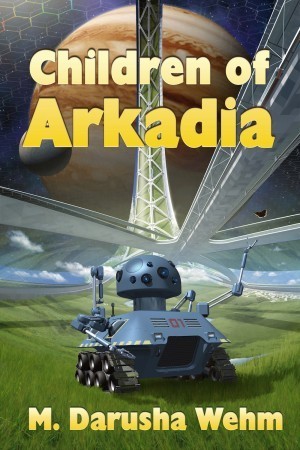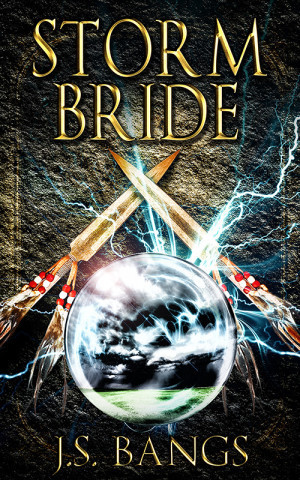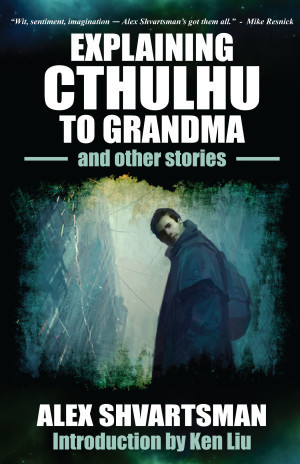M. Darusha Wehm's Blog, page 10
April 2, 2015
Happy (sneaky) Book Day!

tl;dr You can get the ebook of Children of Arkadia NOW
I knew I was having a sneaky digital launch of Children of Arkadia at the New Zealand National SFF Convention Reconnaissance this weekend (come say hi if you’re there!), but my publisher Bundoran Press has given the okay for everyone to be a Kiwi for a day (or four).
So the DRM-free ebooks are available now to buy from the publisher’s website as a zipped epub/mobi combo. Good for all ereaders!
Yay! Happy ebook Day!
April 1, 2015
Recipes of Arkadia: Vyacheslav Haereoa’s Easy Creamy Veggie Soup

Food — growing it, preparing it, eating it — is a central part of life in the Arkadia space colony. Over the next few weeks I’m sharing recipes for some of the food mentioned in the book.
Arkadia isn’t large enough to be able to sustain all crops year round, so its chefs need to be able to improvise based on what is available. This basic soup recipe can be modified nearly endlessly to use different ingredients and create highly varied options.
When Slava Haereoa decided to open a soup cafe, this was the first thing he made. It’s really easy to make, but don’t tell his regular patrons!
Recipes of Arkadia: Vyacheslav Haereoa's Easy Creamy Veggie Soup
Servings
Prep Time
4servings
20minutes
Cook Time
40minutes
Servings
Prep Time
4servings
20minutes
Cook Time
40minutes
Ingredients
1tbsp
oil
1
onion(diced)
1clove
garlic(crushed)
2
potatoes(scrubbed and diced)
3cups
chopped vegetables
4cups
vegetable stock
herbs/spices
salt
pepper
Instructions
Sauté the onion in the oil with salt & pepper, add the garlic.
Add the potatoes, vegetables and stock. Bring to a boil then reduce to a simmer.
Let it cook until the everything is soft. With a potato masher or stick blender, puree everything until it is creamy.
Add herbs or spices to taste. You can add milk or cream if you want a richer soup.
Recipe Notes
Some good combinations:
basil with zucchini (pictured)
chiles, coriander and cumin with pumpkin/carrots
thyme with broccoli
nutmeg with cauliflower
mint with peas
March 10, 2015
Interview with J.S. Bangs, author of Storm Bride

I chatted recently with J.S. Bangs, author of the fantasy novel Storm Bride.
When Saotse rode across the treacherous ocean on an orca at the bidding of Oarsa, Power of the Sea, the blind maiden believed she had been chosen for a great destiny. But she hasn’t heard Oarsa’s voice in decades. Aged now, she has found her place among a peaceful, long-lived people, though her adoptive sister, Uya, still blossoms with youth. Then, pregnant Uya is kidnapped, and the rest of her family is slaughtered when an army of mounted warriors strikes the defenseless capital, leaving Saotse grief stricken and alone.
After Saotse finds refuge with strangers in a distant village, a new Power makes contact. Saotse embraces the opportunity to bury her bloodthirsty enemies in vengeance, but wielding the Power’s bitter magic could cost her everything she is.
As war escalates and allies flock to her side, Saotse believes she finally understands Oarsa’s purpose for her. But the Powers may have set events in motion that even they cannot control, and the fates of gods and men alike hang in the balance.
J.S. writes short fiction as well, and is particularly interested in linguistics and languages, of both the human and computer varieties.
Me: Can you describe your writing for someone who is unfamiliar with it?
J.S.: I like to write epic fantasy in unusual settings. “Unusual” means that I eschew the traditional fake!Europe settings, elves-and-dwarves, as well as the most straightforward quest plotlines. When I do draw inspiration from real-world cultures, I tend to use non-European cultures, or else I’ll just make something up entire. That said, I still love epic fantasy, so you’ll find plenty of gods, kings, magic, and heroes. Among contemporary authors, I would compare my style to N.K. Jemison or C.J. Cherryh.
Me: Would you want to live in the world of your book? Why or why not?
J.S.: I’d love to live there…. but not during the events of the story. The main setting for this book is the city of Prasa, which seems like a really pleasant place to live when it’s not being plundered by barbarians. They have beautiful pebble beaches, a mild climate, and excellent views over the bay and the mountains.
Me: Why did you write this story? What is compelling about it for you?
J.S.: My story ideas always involve the random collision between multiple ideas in my head. On a personal level, this book was written in the period around when my second child was born, and I was very caught up in the process of becoming a parent again. That came through pretty strongly in the character themes of the novel. I had also recently read a wave of Warrior Princess stories, and I was getting a little annoyed with the notion that a “strong female character” meant a girl picking up a sword and killing people. I wanted to write some strong female characters who were resolutely feminine, and who could impact the world without ever holding a weapon.
At the level of plot and setting, I was intrigued by a recurring cycle in the history of Europe and Asia where the “civilized” people living at the edges of the Eurasian continent get overrun by barbarian nomads from the inland steppes, and then the barbarians settle down and become civilized, and then the whole cycle repeats again a few hundred years later. I was also struck by something I learned about the Plains Indians, which is that some of the most iconic “plains” tribes, such as the Dakota, were actually descended from groups who originally lived much further east. But the arrival of European settlers on the Eastern seaboard created a ripple effect of westward movement. Both of these motifs are present in the history and backstory of the setting.
Me: What surprised you while writing it?
J.S.: How gratifying it was. This was my second attempt at writing this story, after my first one ran aground and died on the rocks at 40,000 words. I was nervous about attempting this one again, but I was tremendously relieved to find out that the plot problems which had wrecked the first attempt were fixable, and I fixed them. (They key turned out to be eliminating a major character. Lesson: Don’t be afraid to eliminate whole characters and plot arcs if you need to.)
Me: How will reading it make people feel?
J.S.: By turns intrigued, horrified, anxious, relieved, disappointed, revolted, panicked, and vindicated.
Me: Was there anything you did deliberately while crafting this novel (pacing, language, symbolism…)? Why?
J.S.: I usually create a language for my books, and this book was no exception. For the less linguistically inclined, on this book I especially challenged myself to expand my use of imagery and descriptive language, and it was mostly a success. However, my line editor was a huge help in this regard, because there were a lot of places where she said, “Yes, that’s a very creative metaphor, but it makes no sense.” Good on her :).
Amazon Barnes & Noble Kobo iBooks Google Play
J.S. Bangs lives in the American Midwest with his family of four. When not writing, he works as a computer programmer, and he can occasionally be found gardening, biking, making cheese, or playing Magic: the Gathering.
His short fiction has appeared in Daily Science Fiction, Beneath Ceaseless Skies, Orson Scott Card’s Intergalactic Medicine Show, Heroic Fantasy Quarterly, and other venues. You can read his blog at http://jsbangs.com, or follow him on Twitter as @jsbpax.
February 4, 2015
Even more tech from my novels coming true

Sort of.
In my Dex novels, the virtual world Marionette City lets you do just about anything you can do in the physical world: have a job, have sex, have a meal. I always thought of the latter as being the height of virtual cool.
I’m not the only one, obviously, as this article in Wired profiles a few different teams taking on the problem of simulating food. I kind of love this idea:
experimenting with tongue-based interfaces that can simulate sweet, salty, and savory flavors by sending an electrical current into taste buds.
Mmm… tasty electricity.
* Image from Project Nourished
February 3, 2015
Interview with Alex Shvartsman, Author of Explaining Cthulhu to Grandma and Other Stories

I recently had a chat with author Alex Shvartsman, whose book, Explaining Cthulhu to Grandma and Other Stories, just came out.
Alex is a prolific short story writer, who is also the editor of the Unidentified Funny Objects annual anthology series of humorous SF/F. He knows a thing or two about games, as well.
Me: This is a collection of short stories. Is there any theme or similarity between them?
Alex: My body of work isn’t yet at the point where I can produce a themed collection. Instead, I included what I consider to be my best tales. The title story of the collection won an award and also came in second in the 2013 IGMS Reader Poll. A number of others made Tangent Online Recommended Reading Lists, or were reprinted, translated, and podcasted in various venues. So I’m going for overall quality rather than a singular theme, other than the fact that all the stories are science fiction or fantasy.
Me: Can you describe your writing for someone who is unfamiliar with it?
Alex: I’m proud to be known for writing humorous SF/F, because it’s such a difficult thing to pull off. However, not all stories in this collection are humorous. Some are rather dark (though I wouldn’t describe any as outright horror.) Overall, I try to write fun, plot-driven stories rather than character studies or works that are overly literary. Although I’m certainly not implying a parallel in quality, I strive to write the sort of fiction produced by Mike Resnick, Bob Silverberg, Jim Butcher or Simon R. Green.
Me: Would you want to live in the world of any of your stories (or definitely not want to)? Which one and why?
Alex: Oh, what a fun question! I think I’d enjoy living in the world of Conrad Brent. There are two stories about him in the book, and they take place in our regular world, in the borough of Brooklyn where I live, except magic and supernatural creatures are real, but only one in every 30,000 people can perceive them. There are wizards, and druids, and an enormous troll living under the Verrazano Bridge.
Me: Hmm… I don’t know about that troll. How do you think reading this collection will make people feel? Any ideas it might make readers consider?
Alex: If I do my job right, the reader will experience a rollercoaster ride. There is a mix of humor, adventure, darkness and introspection, and I hope that every reader can find a few favorites. Overall, I’m an optimist and I think my idea stories (especially flash pieces like “Notes on the Game in Progress, Played Almost to a Draw”) really show that. One of my own favorites is the story that concludes the collection: “Fate and Other Variables”. It’s about a hacker and a kabbalist teaming up to break into the Book of Fate and change their futures, and in addition to being a fun story has all sorts of intellectually stimulating ideas about free will.
Me: Finally, should we give this book to our grandmas?
If your grandma is anything like the one in the title story, she’d secretly enjoy the book! (Though she would never admit it, or let it show. She’s a tough old thing.) I strongly urge each of you to buy a copy and read it, that way you’ll be able to form your own opinions as to what the grandmas might think!
Buy Directly
Alex Shvartsman is a writer, translator and game designer from Brooklyn, NY. Over 70 of his short stories have appeared in InterGalactic Medicine Show, Nature, Galaxy’s Edge, Daily Science Fiction, and many other magazines and anthologies. He won the 2014 WSFA Small Press Award for Short Fiction. He is the editor of the Unidentified Funny Objects annual anthology series of humorous SF/F. His collection, Explaining Cthulhu to Grandma and Other Stories released on February 1, 2015. His website is www.alexshvartsman.com
January 15, 2015
Goodreads Giveaway of Children of Arkadia

People of the US, Canada and New Zealand: if you’re on Goodreads, you can enter to win a free paperback copy of Children of Arkadia! Get in to enter before February 15, 2015.
December 14, 2014
Use Only As Directed on sale until 2015

In case you missed it earlier, now is a great time to get an ebook copy of the anthology Use Only As Directed which includes my story “Home Sick.”
Now only $1.99 AUD!
October 29, 2014
How the Culture of Hyperbole is Ruining Everything

The language of culture today is defined by hyperbole: everything is awesome — unless it’s not, then it needs to die in a fire.
It’s a style thing, and it will probably pass, but even though it’s obvious and amusing, the implication that the only options for criticism are unbridled enthusiasm or profound hatred makes for a toxic environment.
Reviews, even bad reviews, are desperately important for creators. They are how we know if we’re accomplishing our task. Milquetoast reviews of “Liked it,” or “It’s okay” don’t really say anything. I’ve often argued that bad reviews are among the most important for a creator, since they help to determine if we’ve found our audience or not. No book, painting, play, video game, poem, dance or song will be to everyone’s taste, not should it me.
Art is individual, taste is subjective. Good reviews help me know I’ve found a receptive audience, but bad reviews help me refine what that means. Bad reviews show me where I’ve hit people’s buttons, where I differentiate my work from someone else’s. And they also show me where I went wrong — where I alienated an audience I wanted to reach. They are a key component of my work.
But the language of hyperbole that pervades popular criticism is as meaningless as vague words like “fine” and “okay.” When everything is awesome, nothing is great. And when everything else should be nuked from orbit, other issues arise.
Criticism is necessary for art to thrive, positive and negative. But creators are human beings and most of us are very close to our work. When we hear people talk about our work in deeply personal, passionately hateful ways, it hurts. And when we are hurt, sometimes we lash out.
I don’t condone authors who stalk their critics, but I can understand how someone might be so hurt that they become obsessed in this way. I don’t condone calling for critics to have their careers sabotaged, but people who feel their own careers have been attacked might turn to revenge. None of this excuses these actions, but a toxic environment makes these bad decisions
Worst still, when most negative criticism is counted in hateful terms, even reasoned and intelligent criticism becomes tainted with spite. When you’re accustomed to hearing worst. episode. ever. it’s easy to hear has some issues with representation with a vindictive subtext. But true criticism isn’t vindictive, which is something that many people (*cough*GamerGate*cough*) don’t understand. There’s a difference between haters and critics, and critics are necessary to the creative process.
It’s time to end the reliance on hyperbole in our reviews and critiques. It has its place, sure, but in moderation. Because intelligent, nuanced discussion really is like a cat with a gun riding a unicorn. Best thing ever.

Notes:
I’m not linking to the specific issues I mentioned because I don’t want to give traffic to people who engage in these activities.
Yes, the title of this post is ironic.
I’d argue that The Lego Movie and the song “Everything is Awesome” are, in part, critiques of the culture of hyperbole. “Everything is awesome, like a Nobel prize or a piece of string.” Indeed.
October 2, 2014
More tech from my novels coming true

Well, potentially, anyway.
The implanted chips that everyone uses in Beautiful Red and the Dex books might be coming down the pike, and for pretty much the same purposes.
From unlocking your front door to silently communicating with people nearby, this implantable chip concept from New Deal Design is pretty much what I envisaged in my books. This was one of the concepts I thought was pretty likely, and like some others, I’m a bit surprised it’s taken this long.
I have to admit, I cannot wait for functional wearable technology that will truly monitor my health and take care of basic stuff like ID and payments. I mourn the loss of privacy and anonymity that existed in my youth, but I believe that ship has sailed, so I might as well make use of constant monitoring for my own purposes.
via Co.Design
image via NewDealDesign
September 25, 2014
News from Plan B, my mystery & crime magazine

In addition to writing SF, I’m the editor of Plan B Magazine, a professional short fiction magazine that publishes mystery, crime and suspense stories. We’ve had a great couple of years so far, bringing readers stories from award-winning authors, one of our originals being on the short list for last year’s Derringer Awards, and starting a podcast of some of the stories we run.
I’m now crowdfunding to support doubling our pay rates for Year Three, as well as some great stretch goals (paperbacks! pro-rates!).
Contributors can get perks like pre-ordering the Year Three anthology, critiques on your short stories, and a beautiful paperback of all the Plan B stories so far. It’s massive: there are 52 stories and it weighs nearly a kilogram.
If you like mystery or crime, or know someone who does, please consider checking out the campaign. Every little bit helps and I’d love to keep bringing these stories to readers.




